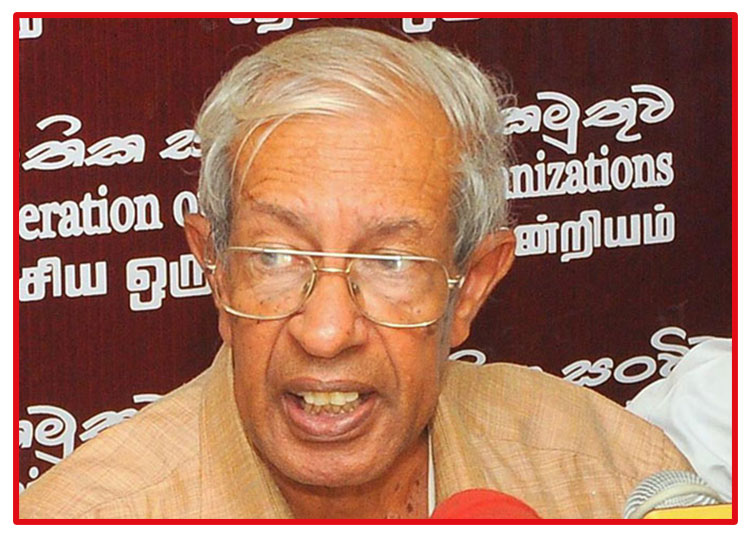NEWS
Lawyer slams SLPP for backing Ranil’s ‘destructive economic agenda’

Kalyananda Thiranagama
… explains how Parliament enacted harmful laws
By Shamindra Ferdinando
Veteran lawyer Kalyananda Thiranagama said that the ruling Sri Lanka Podujana Peremuna (SLPP) should be held responsible for backing President Ranil Wickremesinghe’s economic strategy meant to privatise the remaining state enterprises.
Addressing a public gathering in Colombo, the liberal civil society activist emphasised that the SLPP couldn’t absolve itself of the crime perpetrated by the Wickremesinghe-Rajapaksa government in the form of an economic strategy that would deprive the people of their rights.
Thiranagama, who does not fear to call a spade a spade, declared that UNP leader Wickremesinghe was now implementing the third phase of his despicable project, having already privatised some state enterprises during his tenure as the Industries Minister in the late President Ranasinghe Premadasa’s administration and during the 2002-2003 period when he served as Prime Minister of the UNP-led UNF government.
Now, the SLPP was backing Wickremesinghe’s last phase of that project to sell what is left of the family silver, Thiranagama said, adding that the SLPP voted for the 2024 Budget meant to authorise the President to go ahead.
The Third Reading of the Appropriation Bill (Budget) for the financial year 2024 was passed in Parliament last Wednesday (13) by a majority of 41 votes, where 122 votes were cast in favour of the Budget and 81 votes were cast against. One MP abstained from casting the vote.
Thiranagama reminded the SLPP that it authorised an increase of Value-Added Tax (VAT) from 15% to 18% for products and services while imposing the same on nearly 100 items that weren’t subjected to VAT previously. Declaring the current overall Wickremesinghe-Rajapaksa economic strategy was nothing but a national crime, Thiranagama warned the consequences would be unbearable and irreversible.
The outspoken lawyer urged right thinking people to shed whatever their differences to pave the way for a campaign against the government project. Thiranagama stressed that the government strategy should be opposed and reversed at any cost.
Thiranagama said that the imposition of VAT in a way that is extremely harmful to the people should be condemned taking into consideration some goods were subjected to VAT on more than one occasion, causing a cascading effect. The lawyer declared that all those who protected the incumbent government were traitors.
At the onset of his explosive speech, lawyer Thiranagama emphasized that the Nov 14 Supreme Court ruling in respect of fundamental rights cases against the economic ruination of the country warned politicians and officials regardless of their standing in the society.
That ruling paved the way for the public to move court against politicians and officials in the future, the lawyer said, while questioning the Opposition demand to deprive those found guilty of their civic rights.
Pointing out that pertaining to fundamental rights applications the SC based its ruling on the period Nov 2019-early 2022, Thiranagama explained how the then President Gotabaya Rajapaksa’s administration deprived the government of much needed revenue by either abolishing or reducing a range of taxes. That caused loss of billions of Rupees in tax revenue, the lawyer said. The situation took a turn for the worse when the government decided against seeking IMF intervention, Thiranagama said. Therefore, the SC dealt with reduction and abolition of taxes that led to the weakening of the economy and the failure on the part of the then government to seek an IMF bailout package, he said.
Thiranagama said that there was no basis for claims that the SC, in its Nov 14 ruling, dealt with corruption.
Commenting on the overall economic situation, Thiranagama said that the Yahapalana government, during Wickremesinghe’s tenure as the Prime Minister, enacted Foreign Exchange Act No 12 of 2017 that paved the way for unscrupulous exporters to conveniently refrain from bringing back export proceeds to the country. That law abolished the time-tested Exchange Control Act of 153, Thiranagama said, urging all those concerned to examine the consequences of Foreign Exchange Act No 12 of 2017 and Active Liability Management Act No 08 of 2018.
The so-called Active Liability Management Act No 08 of 2018 was essentially meant to raise loans for the purpose of management of the public debt, Thiranagama said, drawing public attention to how political parties maneuvered Parliament to enact laws immensely harmful to the country.
Commenting on Sri Lanka securing an unbearable amount of ISB’s (International Sovereign Bonds), Thiranagama said that the Active Liability Management Act No 08 of 2018 facilitated that operation during the UNP led Government of 2015 to 2019. The lawyer pointed out that of the total amount of ISBs, USD 12.5 bn were taken during the Yahapalana administration and was one of the primary causes for the current crisis.
Alleging that there hadn’t been at least proper examination of these laws that harmed the country, Thiranagama recalled how it transpired before the Parliamentary Select Committee (PSC) probing April 2019 Easter Sunday carnage that the Central Bank couldn’t inquire into massive amounts of funds received by various parties from suspicious overseas sources.
Thiranagama discussed how the country’s supreme institution, the Parliament, played a destructive role in a political agenda through the enactment of harmful laws. The lawyer also dealt with the ongoing move to privatize the CEB in line with overall government strategy.
Reference was also made to the reversal of the privatization of Sri Lanka Insurance Corporation (SLIC) as well as Lanka Marine Service (LMS) during Chandrika Bandaranaike Kumaratunga’s tenure as the President. However, the UNP leader was now going all out to achieve what he couldn’t do as the Premier during the 2002-2003 period, Thiranagama alleged.
